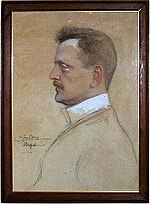Snöfrid
| Snöfrid | |
|---|---|
| Melodrama by Jean Sibelius | |
 The composer in 1904, by Albert Edelfelt | |
| Catalogue | Op. 29 |
| Text | by Viktor Rydberg |
| Language | Swedish |
| Composed | 1900 |
| Performed | 20 October 1900 |
| Scoring |
|
Snöfrid, Op. 29, is a melodrama or "improvisation for narrator, mixed choir and orchestra"[1] by Jean Sibelius. He completed it in 1900 on a text by Viktor Rydberg. It was first performed in Helsinki on 20 October 1900, with the Orchestra of the Helsinki Philharmonic Society, conducted by Robert Kajanus.
History[]
The poem had previously been set in full by Wilhelm Stenhammar (Op. 5) in 1891.[2] Sibelius composed the work in the fall of 1900 on a poem by Viktor Rydberg. He later noted: "I wrote Snöfrid more or less at one sitting after I came home from three days of lively celebrations."[1] The plot on which it is based is inspired by old Scandinavian balladic stories. A female protagonist appeals to her compatriots, in particular a hero, to fight for freedom as a higher goal than fortune, fame and pleasure.[3] Sibelius was inspired by several works by Rydberg, including solo songs and Skogsrået (The Wood Nymph). He liked Rydberg's free verse, expressing both erotic and political ideas.[3] The heroic element possibly appealed to his own battles "with everybody and everything".[4] Sibelius chose dramatic scenes from the poem, such as Snöfrid's "If you choose me, then you choose the tempest."[4] The instrumental prelude depicts a storm at night, with whining strings, howling brass, thundering percussion, but "dominated by melodic and harmonic elements".[4]
The work was first performed in Helsinki on 20 October 1900, with the Orchestra of the Helsinki Philharmonic Society, conducted by Robert Kajanus. The occasion was a lottery to finance a tour of the orchestra to Paris.[1] An unsigned review in the newspaper Päivälehti noted:
However, the most glorious piece of the whole evening was the last work in the programme, Sibelius's latest composition, a melodrama set to the words of Viktor Rydberg's "Snöfrid". ... This most recent of Sibelius's products marks a concrete advance in every respect, both as regards its warm, harmonious atmosphere and the use of visual arts and choir. The work as a whole makes such a warm, heart-felt impression and feels so lucid and inspired that it is indisputably one of Sibelius's masterpieces. Hopefully it will soon be performed again."[1]
Later Sibelius composed the last movement on a different text, Volter Kilpi's Ylistys taiteelle. This version was first performed on 9 April 1902.[1]
Recordings[]
Snöfrid is the title of a 2001 recording of this work along with other music by Sibelius, including the Cantata for the Coronation of Nicholas II, Rakastava (The Lover), Oma maa (My country) and Andante Festivo.[5] On volume 54 of a complete Sibelius Edition by BIS, Osmo Vänskä conducts the Jubilate Choir and the Lahti Symphony Orchestra, the narrator is Stina Ekblad. A review notes that the "galloping early pages" are reminiscent of the Second Symphony and continues:
It is an unusual piece with two turbulently majestic and sometimes idyllic choral sections framing an episode in which a female narrator speaks as the heroine Snöfrid. The orchestral fabric behind the closely-recorded voice is minimal (a soft dark breathing pulse from the brass) similar in approach to much of the instrumental underpinning in Luonnotar.[6]
References[]
- ^ a b c d e "Works for choir and orchestra". Jean Sibelius. Finnish Club of Helsinki. Retrieved 2 December 2015.
- ^ Barnett, Andrew (2007). Sibelius. Yale University Press. p. [page needed]. ISBN 9780300111590.
Unlike Stenhammar, who had set this poem to music in 1891, Sibelius selected only extracts from the poem.
- ^ a b Jackson, Timothy L. (2001). Sibelius Studies. Cambridge University Press. pp. 107, 137–138. ISBN 9780521624169.
- ^ a b c Tawaststjerna, Erik (2012). Sibelius Volume I: 1865–1905. Faber and Faber. p. 214. ISBN 9780571287178.
- ^ Jean Sibelius / Snöfrid, improvisation for reciter, male voices & orchestra, Op. 29 at AllMusic
- ^ Barnett, Rob (2004). "Jean Sibelius (1865−1957)". musicweb-international.com. Retrieved 7 December 2015.
Further reading[]
- Tomi Mäkelä: "Jean Sibelius und seine Zeit" (in German), Laaber-Verlag, Regensburg 2013
External links[]
- Snöfrid, Op.29: Scores at the International Music Score Library Project
- Melodramas
- Compositions by Jean Sibelius
- 1900 compositions
- Compositions with a narrator